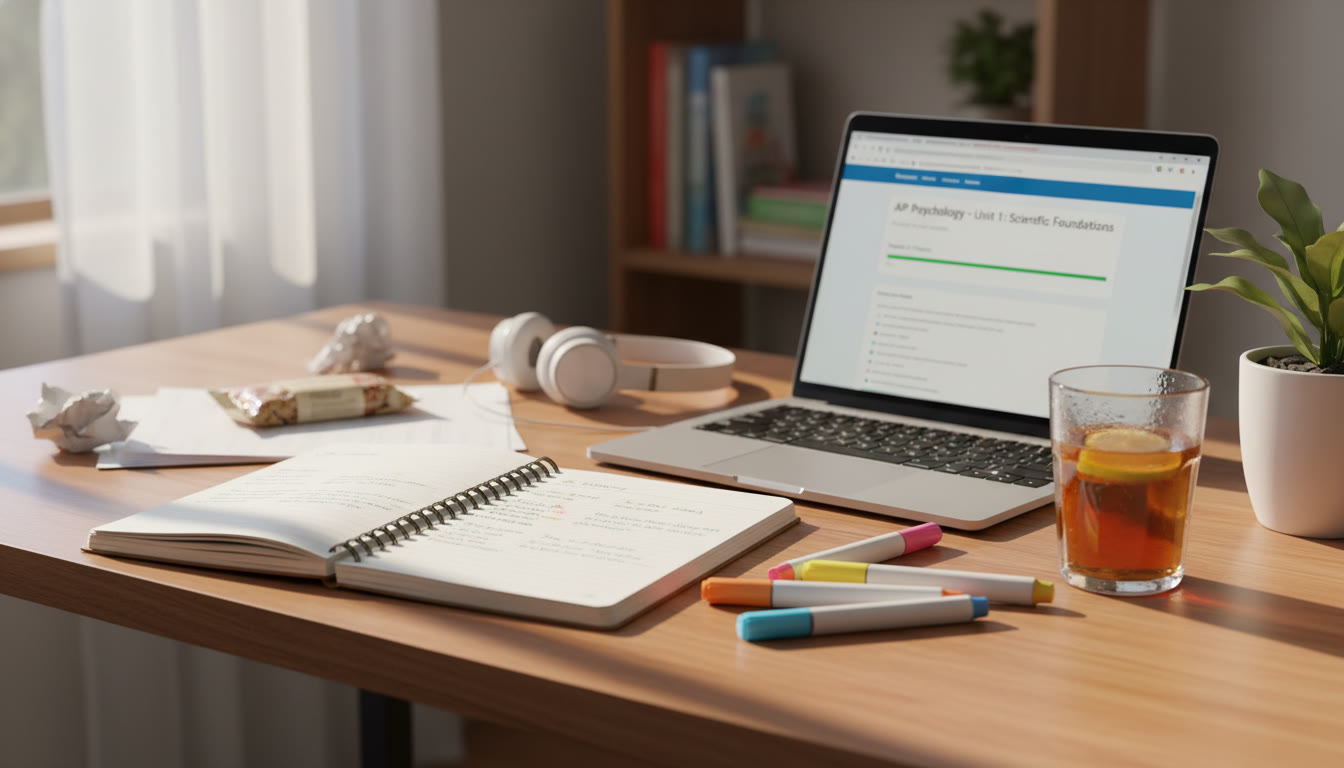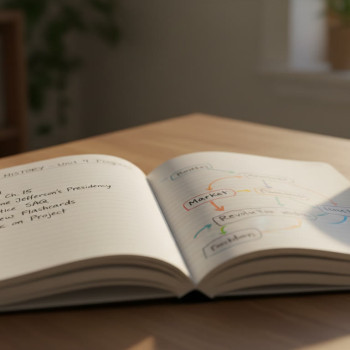Summer Strategy: Which AP Foundations to Build Before School Starts
There’s a special kind of calm that comes with summer: no bells, no homework, and the luxury of time. For many students, it’s also the best opportunity to build the foundations for a successful AP year—deepening skills, closing gaps, and creating systems that carry you through the grind of fall and spring. This is not about cramming content into your brain—it’s about smartly priming the engine so the course you take in September feels less like sprinting and more like running with momentum.

Why Use Summer for AP Prep (Without Burning Out)
Summer is useful for AP prep because you can:
- Rebuild and expand prerequisite knowledge (for example, algebra for Physics or grammar for English).
- Experiment with study rhythms—short daily practice beats long, frantic weekend sessions.
- Lower anxiety by getting familiar with exam structure and expectations ahead of the school-year pressure.
- Start a feedback loop: small practice + quick review = steady improvement.
But remember: preparation shouldn’t replace rest. A well-crafted summer plan balances deliberate practice with free time, social life, and mental recharge.
How to Decide What to Build This Summer
Begin with three questions:
- Which APs are you taking next year?
- What do you already know well—and what makes you nervous?
- How much time can you realistically dedicate each week?
Your answers guide everything. If you’re taking AP Calculus BC and AP Physics C, your summer should skew toward math fluency and calculus previews. If you’re taking AP English Language and AP U.S. History, reading stamina, evidence-based writing, and a short primer on historical thinking should be priorities.
Core Foundations Every AP Student Should Build
Across disciplines there are universal skills that make AP life dramatically easier. Think of these as the scaffolding that supports content knowledge.
1) Study Rhythm and Time Management
Learning to study well beats learning more content poorly. Try this simple summer experiment: 25–40 minute focused blocks (Pomodoro) with 10-minute breaks, 4–6 times per week. Track your sessions in a simple planner: date, topic, and 1 takeaway. This trains attention and reveals how long tasks actually take.
2) Active Reading and Note-Taking
AP exams reward clarity of thought and evidence. Practice active reading: annotate passages (main idea, author stance, supporting evidence), summarize paragraphs in one sentence, and generate one question per section. These habits transfer directly to AP English, History, and Science free-response questions.
3) Writing and Argumentation
Even in STEM APs, clear, concise explanations win points. Spend part of your summer doing micro-writing: write a 200–300 word explanation of a concept you think you understand. Then grade it—did you define, exemplify, and connect to a bigger idea? Repeat weekly.
4) Foundational Math Fluency
Many AP courses (Statistics, Physics, Chemistry, Economics) require quick, confident manipulation of algebra, functions, and basic trig. If those areas feel shaky, build a short math review: 30 minutes, 3 times per week, focusing on problem types you’ll encounter.
5) Test Familiarity
Familiarity with the exam format reduces panic. Use official practice questions for one test preview a week—time yourself, then review answers carefully. Approach practice like research: where do you lose points? Content, time, or question interpretation?
Subject-Specific Summer Foundations
Below are focused, practical plans for common AP subjects. Choose the sections that match your upcoming slate.
AP English Language and Composition
Focus: evidence-based argumentation, rhetorical analysis, reading stamina.
- Daily reading (30–45 minutes): mix nonfiction essays, opinion pieces, and high-quality journalism.
- Weekly rhetorical analysis: pick one article, annotate rhetorical devices, and write a one-page analysis.
- Timed practice: one 40-minute synthesis or argument practice every two weeks; review with an answer-key style rubric to self-score.
AP English Literature and Composition
Focus: close reading, literary devices, thesis-driven essays.
- Read 3–4 short works or 1 novel with attention to theme, character, and form.
- Practice writing a timed poetry analysis and a prose-analysis essay each month.
- Build a quick reference sheet of literary terms and exemplars.
AP Calculus AB/BC
Focus: algebra comfort, functions, limits, and the intuition behind derivatives and integrals.
- Review algebraic manipulation and trigonometric identities for 30 minutes twice a week.
- Spend 3–4 weeks on conceptual videos or guided notes that introduce limits and derivatives—this makes the fall lectures more like review than brand new content.
- Work through real AP-type problems: 10–15 minutes of practice, 2–3 times weekly.
AP Physics (1, 2, or C)
Focus: algebraic problem solving, interpreting graphs, and basic mechanics/electricity concepts.
- Sharpen algebra and units—physics penalizes sloppy math.
- Do conceptual practice (motion graphs, free-body diagrams) before moving to equations.
- If possible, perform a few simple lab experiments at home: motion with a smartphone stopwatch or measuring motion with household objects to build intuition.
AP Biology, Chemistry, Environmental Science
Focus: vocabulary, experiment logic, and data interpretation.
- Create biology/chemistry flashcards for vocabulary and processes; use spaced repetition principles.
- Practice data interpretation: read tables and graphs, summarize patterns, and propose hypotheses.
- Review lab basics: variables, controls, and common experimental methods.
AP U.S. History, World History, Government
Focus: argumentation with evidence, chronology, and thematic thinking.
- Build a timeline of major events; connect events to themes (economy, culture, politics).
- Practice short DBQ-style paragraphs: claim, evidence, explanation—do one weekly.
- Read one accessible history book or long-form article that helps you see cause and effect across eras.
AP Statistics
Focus: data interpretation, probability intuition, and calculator familiarity.
- Review descriptive statistics and basic probability for 30 minutes, twice a week.
- Practice interpreting study results: mean, median, confidence, and sampling issues.
- Do a few practice problems on your calculator to build speed and accuracy.
Weekly Summer Schedule Template
Here’s a sample structure you can adapt depending on whether you’re taking one AP or three. It balances steady practice with rest and variety.
| Day | Focus | Time | Example Task |
|---|---|---|---|
| Monday | Core Skill | 30–45 min | Active reading or math fluency exercises |
| Tuesday | AP-Specific Practice | 40–60 min | Timed practice question + review |
| Wednesday | Project/Deep Dive | 60–90 min | Write a practice essay or complete a problem set |
| Thursday | Rest/Light Review | 15–30 min | Flashcards or quick concept review |
| Friday | Practice Test/Preview | 60+ min | One exam preview problem set or Bluebook test preview |
| Weekend | Catch-up / Relax | Varies | Optional light work or a creative project related to your AP subjects |
This schedule aims for consistency, not intensity. The goal is compounding gains: small, sustainable practice that grows into confidence.
Practical Tools and Resources
Use tools that support feedback and reflection. A few highly practical options include:
- AP Classroom materials and AP Daily videos for course-specific explanations and official practice questions.
- A single notebook (or digital document) for weekly summaries—one page that captures what you learned and what puzzled you.
- A timer app for focused work and short breaks.
- Spaced repetition flashcard apps for vocabulary-heavy courses.
If you’re looking for guided, personalized help, consider targeted 1-on-1 coaching. Personalized tutoring can turn your weak spots into strengths faster by giving you tailored study plans, expert feedback, and data-driven recommendations. For students who want that advantage, Sparkl’s personalized tutoring offers expert tutors, one-on-one guidance, and AI-driven insights that help you focus your summer work where it matters most.
How to Measure Progress Over the Summer
Progress isn’t ONLY about points on practice tests. Track a mix of quantitative and qualitative signals:
- Quantitative: timed practice scores, number of practice questions completed, and average accuracy.
- Qualitative: clarity in your explanations, fewer misconceptions in your notes, and increased speed at parsing questions.
- Behavioral: consistency—did you complete the plan three weeks in a row? Did your attention span for study blocks improve?
Keep a simple spreadsheet or journal with weekly entries. A quick two-question check—”What improved this week?” and “What needs a different approach?”—keeps you reflective and agile.
Common Mistakes Students Make in Summer Prep (and How to Avoid Them)
Summer prep is powerful, but missteps can waste time. Watch for these traps:
1) Trying to Learn Entire Courses
Summer isn’t for finishing the whole AP syllabus. Aim to prime key foundations so you can engage deeply during the course. Bite-sized mastery beats broad but shallow exposure.
2) Ignoring Weak Fundamentals
Students often race to advanced topics and then get stuck. Identify and fix prerequisite gaps early—algebra before calculus, grammar before essay refinement.
3) Cramming for Confidence
One-off marathon sessions give the illusion of productivity. Spaced, active practice builds durable knowledge and reduces stress during the year.
Example Month-by-Month Summer Plan (Two Months)
Here’s a compact plan for students with a two-month summer who are taking 1–2 APs.
- Weeks 1–2: Diagnostic and Foundation. Take a low-stakes diagnostic (one practice section). Identify 3 weak areas. Build a 4-week micro-plan for those gaps.
- Weeks 3–4: Skills and Rhythm. Work on study rhythm, math fluency, writing micro-practices, or lab basics depending on the course.
- Weeks 5–6: AP-Specific Practice. Start timed sections, work on pacing, and practice free-response questions.
- Weeks 7–8: Synthesis and Reflection. Re-take the diagnostic, compare results, and write a one-page plan for the fall semester with prioritized goals.
How to Use a Tutor Effectively This Summer
Tutors can accelerate your summer work if used strategically. Here’s how to get the most from one-on-one sessions:
- Bring a clear objective to each session (fix a concept, review a practice essay, correct recurring mistakes).
- Ask the tutor to model exam-style thinking: how to approach a question, what to underline, and how to structure answers under time pressure.
- Request a short, personalized study plan at the end of the month and a checklist of 6–10 target items to practice independently.
Sparkl’s personalized tutoring blends expert tutors with AI-driven insights and tailored study plans—helpful for students who want fast, focused gains without guessing where to spend their time.
Final Advice: Keep It Enjoyable and Sustainable
The best summer prep is one you can sustain and enjoy. Mix in curiosity projects—read a book related to your AP subject, build a tiny experiment, or write a short research reflection. These projects deepen interest, make learning memorable, and keep motivation high when the school year begins.
Remember: summer is a chance to choose how the year begins. Small, steady investments in fundamentals—study rhythm, math fluency, writing clarity, and targeted practice—compound into confidence and better scores. Build a plan that fits your life, measure what matters, and don’t hesitate to ask for help when you need it. A few well-placed tutoring sessions, a consistent schedule, and a reflective notebook can change your entire AP experience.
Parting Checklist: What to Finish This Summer
- Create a realistic weekly schedule and stick to it for three weeks.
- Complete one official practice test section and analyze the mistakes.
- Close at least one major prerequisite gap (algebra, grammar, lab basics, or data interpretation).
- Write two timed responses—one short and one extended—and revise them.
- Set three academic goals for the fall and one reward for achieving them.
Start small, stay steady, and enjoy the process. With the right foundations, the AP year will feel less like surviving and more like doing your best work. If you want a tailored summer plan or a few focused tutoring sessions to make every minute count, reach out for personalized guidance—one-on-one support can make a surprisingly big difference.

Ready to Begin?
Pick one foundation to start right now: a 20-minute diagnostic, a 30-minute review session, or a single practice essay. Do it today, reflect on it, and give yourself permission to improve steadily. The summer you build intentionally will pay off when the bell rings.
Good luck—and remember: progress is a series of small, thoughtful steps. You’ve got this.















No Comments
Leave a comment Cancel